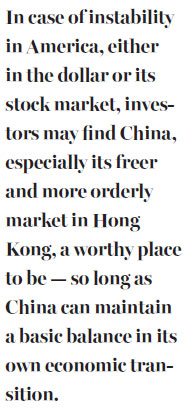Connecting to investors' needs
Both its economic growth rate and currency stability can make China a useful hedge against the United States
The beginning of this week saw the opening of stock trading connection between Hong Kong and Shenzhen, a stock market on the Chinese mainland that features most of the country's technology companies.
Back in November 2014, the stock trading connection between Hong Kong and Shanghai, the largest stock market on the mainland, went into operation.
The Shenzhen-Hong Kong connection is important first of all because it marks the completion of a system able to synchronize trading in the three main securities markets in the country and help Chinese investors access securities markets in other parts of the world.
With more than $3 trillion (2.79 trillion euros; 2.373 trillion) in total market capitalization ($16 trillion for New York, by comparison) and robust trading - of which around half is by investors from the outside - Hong Kong is an important capital market in the world.

The Chinese regulatory authorities are commendable for linking up the two domestic stock markets with a more open and mature market like Hong Kong to help reform the trading culture in the domestic markets in such a way as to be closer to international rules and norms.
Furthermore, the timing for setting up the stock trading connection is also important - for investors to evade some risk in currency exchanges and also to avoid putting all their eggs into one basket, meaning the basket of the US dollar and US market.
At the moment, as ample signs are suggesting a rally in the dollar (against all other major currencies) and a rally in American stocks - potentially benefiting from the tax cut and investment hike in public infrastructure that Donald Trump promised - it may be hard for investors in the world to resist the temptation for converting their money into the greenback.
For some time now, China's foreign exchange reserve and its renminbi's price against the dollar have both been on the decline, because Chinese money has been used for overseas buyouts of assets in large volume.
But the Chinese companies' overseas buying spree cannot be sustainable, judging from the trend emerging in the United States. Assets are becoming more expensive. Government is becoming restrictive.
If the American rally continues, liquidity will have dried up a few months from now and investors will be forced to give up some of their interests. Many Chinese investors are already talking about the need to deleverage before it is too late.

For them, foreign currencies, especially the dollar, will be more precious. But the renminbi won't become less significant simply because of its falling exchange rate against the dollar in recent months, because it is still relatively stable compared with other currencies' rate against the dollar.
Both its economic growth rate and currency stability can make China a useful hedge against the United States, as Sun Mingchun, chairman and chief investment officer of Hong Kong-based Deepwater Capital, pointed out.
In case of instability in America, either in the dollar or its stock market, investors may find China, especially its freer and more orderly market in Hong Kong, a worthy place to be - so long as China can maintain a basic balance in its own economic transition.
At least in the foreseeable future, one can be almost certain that China's three stock markets combined can be a more attractive market than many other places.
With Hong Kong's stock trading connections with Shanghai and Shenzhen, Chinese investors will not have to exchange all their money into dollars at this time of uncertainty but still chase the value in a dollar-denominated market - which is part of Hong Kong's uniqueness.
This is because, first, the Hong Kong dollar is pegged to the US dollar in its exchange rate and the Hong Kong stock market is a highly international one.
Second, the trading connections with the mainland don't require investors to exchange their money when they invest in Hong Kong.
Given some time, the existing trading connections can easily expand their functionalities by facilitating trade in bonds and in international investment funds, thus making the entire Chinese financial system more open and more agile in correcting its excesses.
The author is editor-at-large of China Daily. Contact the writer atedzhang@chinadaily.com.cn
(China Daily European Weekly 12/09/2016 page12)


















